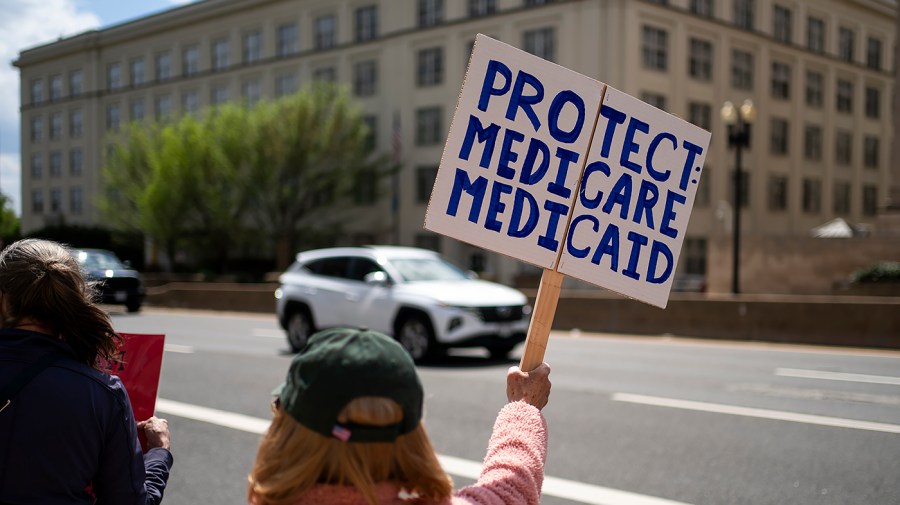Advocates are warning lawmakers that the proposed cuts to Medicare and Medicaid will leave millions of pregnant Black women at a heightened risk of death, worsening the maternal mortality crisis and its racial disparities.
Last month, the House budget resolution proposed up to $880 billion in cuts to Medicaid over a decade, which would also lead to cuts to Medicare.
But advocates say Medicaid is a vital resource for cutting into the maternal mortality disparities.
“We often see these cuts as: We’re making sure that people who ‘don’t deserve’ these programs are not getting it. But in actuality, it’s disproportionately going to impact people of color, women of color,” Rolonda Donelson, Huber Reproductive Health Equity legal fellow at the National Partnership for Women & Families, told The Hill.
While Medicaid finances about 40 percent of all births nationwide, more than 64 percent of births by Black moms are covered by Medicaid.
Still, Black women are three times more likely to die from pregnancy-related complications than white women. Some of these conditions include preeclampsia, postpartum hemorrhaging and blood clotting.
Eighty percent of those deaths are preventable, according to the Centers for Disease Control and Prevention.
For Natasha Ewell, Medicaid allowed her to safely deliver her third child. When Ewell was pregnant with her son, she felt what many Black women feel: excitement, happiness — and worry.
Ewell was over 35, so she was already a high-risk patient. Then Ewell unexpectedly lost her job, and with it, her insurance. Desperate for coverage, she enrolled in Medicaid.
In her first trimester, Ewell was diagnosed with oligohydramnios, a condition characterized by low amniotic fluid. The results of oligohydramnios can be drastic, sometimes affecting fetal development or causing complications during labor and delivery.
In some cases, oligohydramnios can cause stillbirth.
When Ewell’s doctor discovered her diagnosis, he scheduled her for weekly checkups to ensure both she and her son were healthy and safe.
“It was very important for me to have that insurance, because having to go weekly – I can’t imagine the co-pays for that. And these were specialists that I had to see,” Ewell said. “It would have been a scarier pregnancy. This condition, it wasn’t like leaking or spotting. If my fluid was low, I didn’t have ways to check that. I wouldn’t have known.”
Ewell eventually delivered a healthy baby — several weeks early via c-section — but she says without public health insurance she doesn’t know if that would have happened.
The proposed cuts, she said, have her increasingly worried for future mothers, as it could force them to make a decision: risk the pregnancy and potential financial devastation, or terminate.
“I cannot imagine not having my son here. Who are they to make me have that choice between having this wonderful, amazing young boy that loves robotics, that’s going to be part of the next generation, and who knows what he’s going to be able to do?” Ewell said.
Medicaid’s coverage of prenatal care is vital to closing the gaps in the maternal mortality crisis, said Stacey Brayboy, senior vice president of public policy and government affairs at March of Dimes.
Medicaid’s prenatal care can help cover not only screenings like Ewell needed each week, but can also help track pregnant people’s cardiovascular health, risks for preeclampsia, high blood pressure and glucose levels — all chronic stressors that can cause preterm births.
“The idea is to look at how we decrease the effects of preeclampsia and preterm birth and look at a lot of other pregnancy related tests to your pregnancy journey,” said Brayboy.
Not only could this help close the racial disparities in the maternal mortality crisis, but also the infant mortality crisis where Black babies are more than two times likely to die than their white counterparts.
But Medicaid cuts could also rollback gains made in recent years to expand the insurance’s coverage postpartum.
March of Dimes was among several organizations that successfully advocated for Medicaid to expand postpartum care from 90 days to a full year.
That’s because deaths from heart conditions and mental health–related conditions are most common in the year following delivery.
But at least 10 states have trigger laws, Brayboy said, which would eliminate the extended postpartum care.
Brayboy is also concerned over what conditions may no longer be able to be studied with the proposed cuts.
“Those cuts are going to impact research, and research helps drive some of the policy changes,” said Brayboy. “These Medicaid proposed cuts are going to roll back all the progress that we’ve made and have a ripple effect. It’s not going to just be isolated cuts; this will go across the entire maternal health ecosystem.”
There are members of Congress who are trying to create policies to cement research to end the Black maternal health crisis.
Rep. Ayanna Pressley (D-Mass.) told The Hill she is working with Sen. Cory Booker (D-N.J.) to build support for their Mommies Act.
The act would expand Medicare cover for pregnancy, labor and postpartum services, along with directing the Centers for Medicare and Medicaid Services (CMS) to issue guidance encouraging community-based doula care.
The Act would also increase Medicaid minimum reimbursement rates for maternal and obstetric services for people in underserved areas and establish a maternity care home model demonstration project.
“Policy determines who lives, who dies, who survives and who thrives,” Pressley, a member of the Black Maternal Health Caucus, told The Hill. “I am not being hyperbolic when I say these layered crises created by policy violence and neglect are a death sentence for Black moms.”
Pressley said the Black maternal health crisis is personal to her — her paternal grandmother died in the 1950s giving birth to her uncle.
“It was incredibly devastating and destabilising for our family. You talk about generational trauma — every woman in their reproductive years has been told that story,” said Pressley. “I cannot believe my grandmother suffered a fate that was preventable in the 1950s and here we stand in 2025 with the same devastating disparate outcomes.”
Advocates say most of the work to combat the Medicaid cuts must come from Congressional leaders. But Donelson, of the National Partnership for Women & Families, added that families must come forward too.
“I think it’s important for people who get their insurance through Medicaid, or have benefited from Medicaid in the past, to call their members of Congress, write to their members of Congress, post on social media and make a lot of noise about how Medicaid has benefited them and their families and how this program is critical to their health care,” said Donelson.

